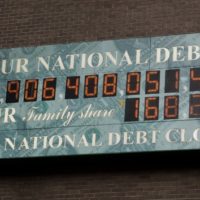
400tmax/iStockBy CATHERINE THORBECKE, ABC News
(NEW YORK) — Even before the coronavirus pandemic pushed government spending off the charts, the national debt was snowballing at an alarming rate.
The national debt has ballooned to its highest levels since World War II amid the pandemic, and the federal debt held by the public is expected to eclipse the size of the entire U.S. economy, measured in GDP, by next year, according to the Congressional Budget Office’s most recent outlook.
Government debt during so-called “war times” — or in a global health crisis — might not necessarily be a bad thing, economists say. But eventually, this debt will have to be serviced, putting a looming burden on future economic growth and the next generation.
“It’s helpful in the short run, but it could be harmful in the long run,” Bill Gale, a senior fellow at the Brookings Institutions, told ABC News of government borrowing.
“The example I give people sometimes is, say it’s the middle of the afternoon and your energy is lagging, if you ingest sugar and caffeine you will get a boost of energy,” he said. “But if your long-term diet is sugar and caffeine, you will find yourself lagging.”
What is the national debt?
The unfathomably massive gross national debt currently tops $26.7 trillion, according to the Treasury Department.
That gross national debt figure is broken up in two parts, with approximately $20.8 trillion of it being debt the public owes and approximately $5.8 trillion of it stemming from intergovernmental holdings such as Social Security trust funds or other cases where the government essentially owes itself money.
“It’s the $20 trillion that economists worry about because that’s the money that influences the credit market, that’s how much the government owes,” Bob Bixby, the executive director of the Concord Coalition, a nonpartisan fiscal responsibility advocacy group based in Washington, D.C., told ABC News. “How much the government owes itself doesn’t really have an effect on the economy, it’s more of a bookkeeping issue.”
The national debt accumulates as the government runs budget deficits year after year. The budget deficit is the annual difference between government spending and revenue. Largely due to the pandemic, in just Fiscal Year 2020, the CBO forecasts a deficit of $3.3 trillion — more than triple the shortfall in 2019 — and the largest deficit as a percent of GDP since 1945.
“People have no way of understanding what that means when you get to the ‘umpteenth trillion dollars,'” Gale added. “One way people try to get a more realistic understanding of it is to scale it relative to GDP.”
In FY 2020, the federal debt held by the public is expected to be 98% of total GDP, compared with 79% at the end of 2019. In 2021, it is expected to exceed 100% of GDP, and projected to rise to 107% of GDP — the highest on record — by 2023, according to the CBO’s most recent outlook.
Bixby added that it is useful to measure the debt against the size of the nation’s economy, “because the size of the economy is what you’re going to use to pay that debt.”
How has the pandemic influenced the national debt?
The health crisis and ensuing economic catastrophe brought by the COVID-19 pandemic caused government borrowing to soar, but even before that the national debt was already huge, economists say.
“Well before the pandemic, we were at the highest level ever except for a few years around the second World War,” Gale told ABC News. “Now it looks like we’re going to blow through the war level targets in a year or two.”
Gale noted that the pandemic and policy response “generated a lot more government spending and tax cuts,” but added that in times of crisis that is not necessarily a bad thing.
“I want to be clear we needed that spending and those tax cuts, because the various shutdown and work-from-home orders required people to detach from the economy, so we needed a government boost to offset that,” he said.
Moreover, interest rates amid the pandemic are currently very low. While the overall ramifications of low interest rates on the economy at large can get complicated, Gale noted, “it may or may not be good news for the economy, but it’s good for the budget.”
“We’re in very unusual times with the high debt, but extremely low interest rates,” he added. “The low interest rates are doing a lot of the work in keeping the fiscal situation sane. If interest rates were to rise significantly, we would face much bigger long-term fiscal burdens.”
Bixby added that the surging national debt in the pandemic could be viewed as a benefit in the “very, very short term.”
“You have to distinguish between the short-term spike in the deficits, which is responsible in an emergency, and the long-term trend of debt, which would ultimately be ruinous for the economy,” Bixby said. “I would use another analogy, which is when you’re sick, you take medicine, when you recover you stop taking the medicine. Right now the deficits are an important medicine for the illness that the nation has, but you just don’t want to plan a long-term policy around it.”
Bixby also noted that even before the pandemic hit, the debt was rising relative to the size of the economy despite a robust economic recovery from the Great Recession.
“It’s important to note that the reason the budget was already on an unsustainable track before the pandemic hit was not because of waste, fraud or Congress spending like drunken sailors,” Bixby said. “The budget has an underlying structural mismatch between spending and revenue.”
Because a lot of the budget goes toward Social Security, Medicaid and similar programs, “as the Baby Boomer generation is retiring and qualifying for these programs, that automatically increases spending for the year,” he said.
While it is likely the deficit will come down as the pandemic eases, he said we will likely still be growing the debt faster than the economy.
Why does this matter and who will pay it?
Despite the U.S. budget deficits (the building blocks of national debt) continuing to rise, public concern about it in recent years has fallen, according to a Pew Research Survey released last month.
The survey found that 47% of adults called the deficit “a very big problem” facing the country today, down from 55% in 2018, even though the actual deficit figure rose approximately threefold during that same time.
The same survey found that older Americans and Republicans are more likely to call the deficit a very big problem compared to Democrats or younger people — despite the younger generation being the ones to bear the burden of it.
“The reason why it’s difficult to get any political action on this is that short term, it’s very easy to ignore and it’s the long term that pays, so it’s really a generational issue,” Bixby said. “You have to be concerned about the future of your children and grandchildren and certainly about the future of your country in order for this issue to resonate with you.”
Over the long term, the skyrocketing federal debt will make it more difficult for the government to invest in things like infrastructure, education, defense and more.
In addition to the spending cutbacks, the ballooning debt could also mean taxes would be raised to levels that could have a bad effect on the economy as a whole.
Another concern is that when the U.S. runs large budget deficits while trading partners like China exercise fiscal discipline, the U.S. trade deficit will grow. U.S. trade deficits have helped cause tariffs and trade wars with the rest of the world.
“It’s really a balancing act and it’s difficult to say the deficit is affecting me in this way, today,” he said. “I think what people need to do is think about what is good for the long-term health of the economy and the prospects for future generations and consider the debt on that basis.”
Copyright © 2020, ABC Audio. All rights reserved.











